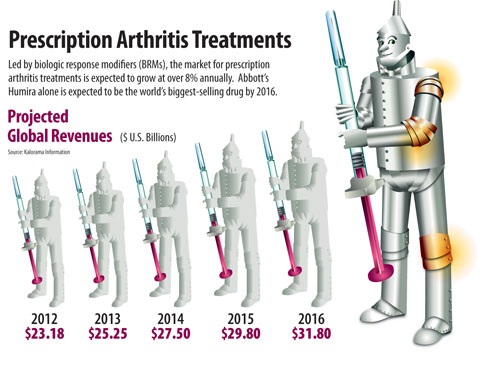January 1, 2012 (Vol. 32, No. 1)
Biologic Response Modifiers Dominate Market that Could Exceed $20B in 2011.
Arthritis is one of the most common human ailments worldwide. For this reason it is a popular target with pharmaceutical companies. Many biologics have been developed to allow rheumatologists to do more than just treat the symptoms of arthritis pain. Increasingly, biologics are being used to actually change mechanisms of the patient’s immune system and growth factors. This has lead to strong revenue growth in the market for prescription treatments.
Arthritis is a complex family of musculoskeletal disorders. The most crippling of the arthritis family is rheumatoid arthritis. In the United States, approximately 1% to 2% of the population is affected. Women are two to three times more likely to develop RA than men, and the peak incidence occurs between the fourth and sixth decades.
Symptomatic treatments have traditionally been used for patients with arthritis. While these treatments are still used regularly, new disease-modifying therapies have produced the most impressive results in treating more severe types of arthritis. Led by biologic response modifiers, the market for prescription arthritis treatments will exceed $20 billion in 2011, according to Kalorama Information. In particular, drugs such as Remicade or Humira that attack tumor necrosis factor (TNF) have led this market to 7.3% growth in revenues.
Biologic response modifiers are true biologic compounds because they are made from living cells. The homeostatic mechanism of immunity is essential for human survival. Biologic therapy or biotherapy, previously termed immunotherapy, is a broad term used to describe the use of agents derived from natural sources that both augment and suppress the body’s immune activity.
Tumor necrosis factor (TNF) mediates a number of immunologic events indicating it plays an important role in host response to inflammation. TNF stimulates macrophage-mediated antitumor activity, endothelial cells, and granulocytes. Research has shown that TNF-induced effector molecules are responsible for the cytotoxic activities of natural cytotoxic cells that may be important in natural immunity. These cells can cause tumor cell lysis, but also initiate the inflammatory cascade. Leading anti-TNF therapies include Enbrel, Humira, and Remicade. Anti-TNF drugs lead biologic arthritis treatments and all arthritis treatments.
There are other types of biologics that deserve mention. Cyclosporin is a cyclic peptide of 11 amino acid residues with potent immunosuppressive activity but no effect on the acute inflammatory reaction. Glucocorticoids are an immunosuppressant drug category that restrains the clonal proliferation of Th cells, through decreasing transcription of the gene for IL-2; however, they also decrease the transcription of many other cytokine genes.
Azathiprine interferes with purine synthesis and is cytotoxic. Excessive purine synthesis is associated with some cases of gouty arthritis. Both cell-mediated and antibody-mediated immune reactions are depressed by this drug since it inhibits clonal proliferation in the induction phase of the immune response by a cytotoxic action on dividing cells.

Major Biologic Arthritis Products
Abbott’s Humira is the most successful arthritis treatment and, in fact, Kalorama Information forecasts that it will likely become the world’s largest selling drug by 2016. However, new products on the horizon and other factors may challenge this dominance over the next five years. Humira is an injection that can be self-administered and is usually given every two weeks.
Kineret (Kineret-Amgen) blocks the biologic activity of naturally occurring IL-1-beta by competitively inhibiting the binding of IL-1 to the interleukin-1 type I receptor (IL-1RI). Simulect (Novartis) works by blocking the receptor for IL-2, a protein that simulates proliferation of T-lymphocytes. The product is mainly used for organ transplant rejection but has some value in treating rheumatoid arthritis.
Zenapax (Roche) is a monoclonal antibody with immunosuppressant action given by intravenous infusion and can cause serious hypersensitivity reactions. Enbrel (Amgen) reduces joint inflammation by blocking chemical TNF. The product is administered by self-injection once or twice per week.
Other biologic prescription arthritis products include Remicade (Janssen), Rituxan (Genentech), and Orencia (Bristol-Myers Squibb).
Rheumatologists are increasingly seeking to deal with arthritis pain by modifying the disease rather than the pain symptom. This can be done with traditional chemical therapies called DMADs, but biologics have a better success rate and are thus increasingly used.
In 2010, traditional therapies were 72% of the market. By 2016, Kalorama Information forecasts that biological response modifiers will represent 80% of the market for all prescription arthritis treatments. Yet the prescription arthritis market is not without its challenges for all drug makers.
The numbers of arthritis sufferers has attracted considerable research and development funds. Products in development may challenge biologic dominance and particularly challenge anti-TNF drugs such as Humira. The strongest near-term competitor is Pfizer’s tofacitinib, a JAK1-3 inhibitor. Tofacitinib is a small molecule therapy that can be manufactured more cheaply than biologic therapies. However, there are some safety concerns with the product. On-going Phase III trials will help to sort out the concerns and provide potential indications.
Reimbursement is also a challenge. Arthritis is an area where biologic treatments are popular, and thus the size of the market reflects the higher cost of biologics pricing as opposed to traditional treatments. Reimbursement for high-price biologic medicines will be challenging over the next few years as payors seek to manage cost through purchasing arrangements and cost-sharing with their insured population, which could limit revenue growth.
Bruce Carlson ([email protected]) is publisher at Kalorama Information. More information on The World Market for Prescription Arthritis Treatments can be found at Kalorama Information’s website.



